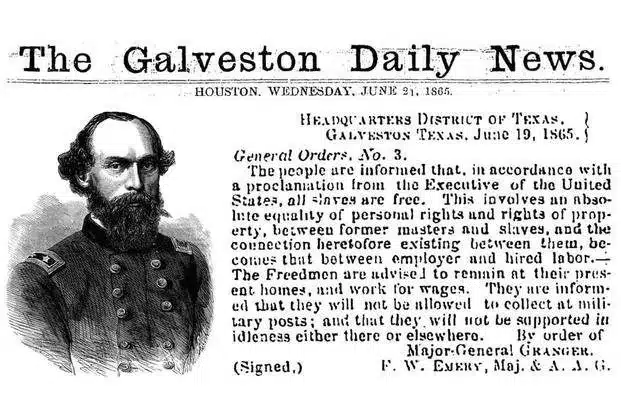This article first appeared on the Magnolia Tribune.
The nearly 160-year-old holiday of Juneteenth has been drawn into the “culture war.” Combatants should put down both their arms and divisive narratives. The end of slavery and the move toward a more perfect union — one in which the promised liberty of the Declaration of Independence extends to all people — is worthy of celebration.
The history of the moment is important.
On January 1, 1863, President Abraham Lincoln signed the Emancipation Proclamation, declaring that “all persons held as slaves are, and henceforward shall be free.” The Proclamation, however, was limited to slaves held in confederate territories, and in effect, only took force when the Union army gained control of area.
Two years later, on January 31, 1865, Congress passed the 13th Amendment to the Constitution abolishing slavery, though the amendment was not ratified until December of 1865. On April 9, 1865, Confederate General Robert E. Lee surrendered to Union General Ulysses S. Grant at Appomattox.
It took time for the word of the South’s surrender and the emancipation of slaves to spread. On June 19, 1865, Union troops arrived in Galveston, Texas, the last place to be notified. General Gordon Granger announced that slaves in Galveston were free, “this involves an absolute equality of personal rights and rights of property.”

As early as 1866, Black Americans in Texas began celebrating Juneteenth, an observance that spread through Black communities in the South. Texas issued a proclamation recognizing the holiday as “Emancipation Day” in 1938 and as a recognized state holiday in 1980.
Juneteenth became a celebration of gained freedom and a way to honor the sacrifices and contributions of Black Americans. While central to certain Black communities, the holiday labored in relative obscurity for broad swaths of the nation until the death of George Floyd in May of 2020, and the subsequent increased focus on race in America.
Even without heavy public awareness, 47 states, including Mississippi, recognized Juneteenth as an state observance before Floyd’s death. In the wake of his death, 26 states have joined Texas in recognizing Juneteenth as a permanent holiday.
In 2021, Juneteenth was officially declared a federal holiday.
For some, unfamiliar with the history behind Juneteenth, the holiday feels newly made up, or worse, like a part of a social agenda. Some critics view it with the same suspicion with which they view “Critical Race Theory” or DEI initiatives — as a ‘woke’ attempt to elevate race above all else and further divide America.
This criticism, to a degree, is fortified by the rhetoric used in making Juneteenth a national holiday. The bill creating the holiday was entitled “Juneteenth National Independence Day Act,” a title that was read by some as an effort to create two national independence days, or to diminish the Fourth of July. In his statement about the holiday’s creation, bill sponsor Congressman Ed Markey used it as an opportunity to push a progressive narrative about our nation’s lack of progress:
“We must ensure police accountability and put an end to the cycle of brutality and murder by law enforcement. We must put economic justice, health justice, and environmental justice at the center of all our work. Creating this federal holiday is just one step in our nation’s ongoing journey towards racial justice and liberation.”
In an era where everything is hyper-partisan and ideological, it’s not hard to imagine that a hard progressive push of a holiday would be met with a hard conservative pushback. In my view, that’s a mistake.
Conservatives should freely embrace the celebration of Juneteenth. The holiday, in true form, is not a rival to Independence Day. It is a celebration of a more fulsome and equal application of the ideals enshrined in the Declaration of Independence. It is proof of our progress toward the lofty aspirations of our founding documents.
Our nation was founded on high-minded, beautiful principles. When we broke our bonds with England, we declared that all men were created equally. We said people were endowed by their Creator with unalienable rights. Among them, the right to life, liberty, and the pursuit of happiness.
In practice, we failed to live up to this vision. The sin of slavery not only serves as a blight on our nation’s history, but reinforces to this day so much of the racial distrust, division and tension we experience.
Emancipation, the catalyst for the Juneteenth celebration, marked a step toward fulfilling the shared promise of our nation–that all people, of all colors and creeds, have the right to life, liberty, and the pursuit of happiness.
Recognizing the holiday comports with the American tradition of celebrating independence. It is a complement. Juneteenth is also a reminder of the need to be vigilant in restoring and maintaining the delicate ties that knit us together as a people. It is emblematic of the imperfect, and at times slow, march toward justice.
Opal Lee, the 97-year-old “grandmother of Juneteenth,” has preached that the holiday should be one that unifies, not divides Americans:
“I believe Juneteenth can be a unifier because it recognizes that slaves didn’t free themselves and that they had help, from Quakers along the Underground Railroad, abolitionists both black and white like Frederick Douglass and William Lloyd Garrison, soldiers and many others who gave their lives for the freedom of the enslaved.”
I think she’s right. Happy Juneteenth.
This article first appeared on the Magnolia Tribune and is republished here under a Creative Commons license.
Read original article by clicking here.

